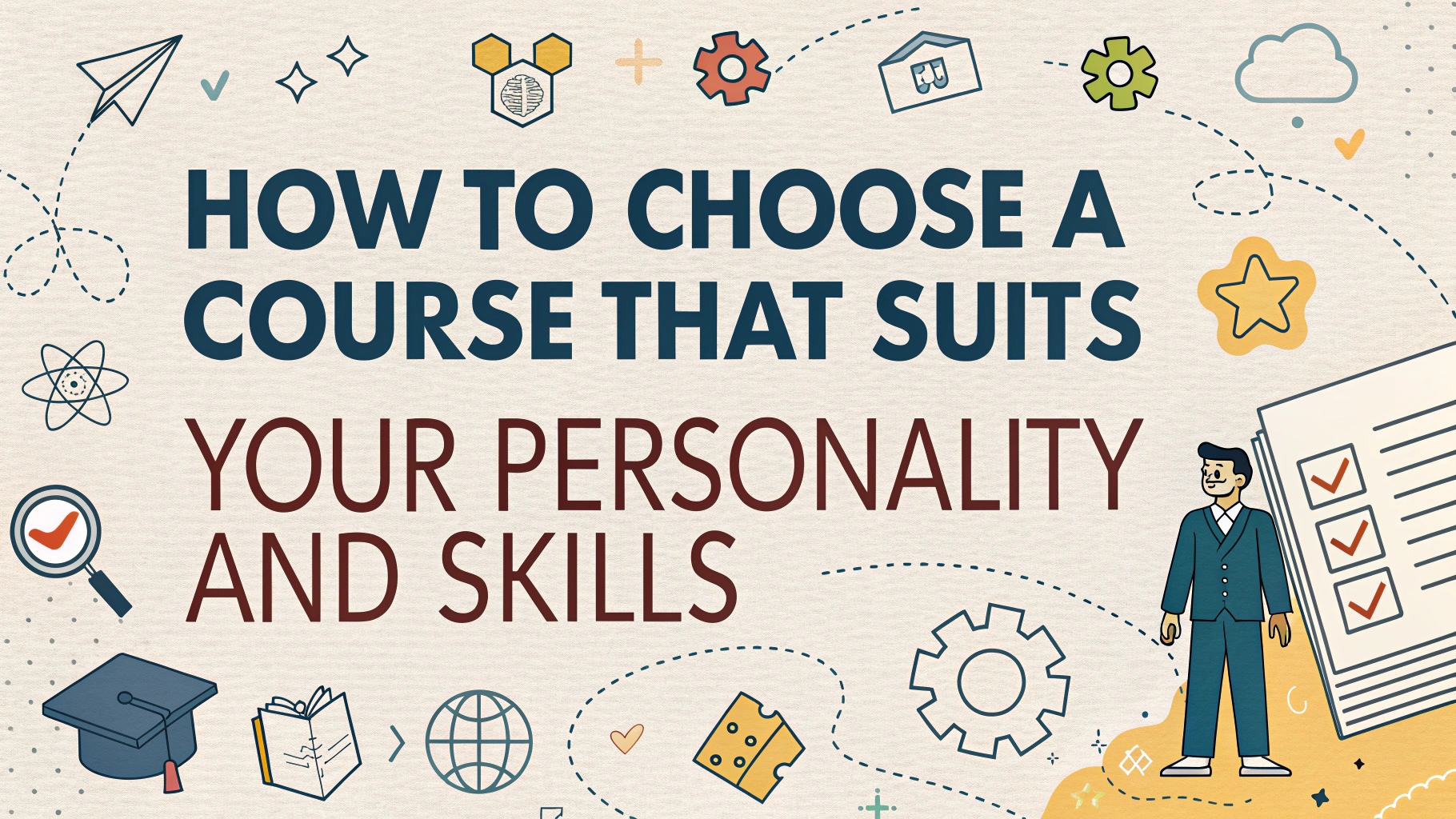How to choose a course that suits your personality and skills

Choosing the right course isn’t just about what’s popular or what your friends are studying—it’s about finding a path that fits you. A course that aligns with your personality and skills can lead to better academic performance, increased motivation, and greater career satisfaction. In this guide, we’ll walk you through a step-by-step process to help you make a smart, personal, and practical choice for your future.
Why Your Personality and Skills Matter
Studies show that students who choose courses that reflect their personality and abilities are more likely to succeed. According to research by Eduloco and Upskilled, selecting a course based on your personality can:
-
Improve academic motivation and performance
-
Boost long-term job satisfaction
-
Help you connect with like-minded peers
-
Lead to a more enjoyable learning experience
Whether you’re creative, analytical, empathetic, or outgoing—there’s a course that fits who you are.
Step 1: Understand Yourself
Before you browse university websites, take a moment to reflect:
-
What subjects do you enjoy?
-
What are you naturally good at?
-
Do you prefer working with people, data, tools, or ideas?
Use personality tools to get deeper insight:
-
MBTI Personality Test – Helps identify preferences like introversion vs. extroversion.
-
Holland’s RIASEC Model – Matches you with personality types (Realistic, Investigative, Artistic, Social, Enterprising, Conventional) and related career paths.
Example: If you’re an Artistic type, you may enjoy studying design, photography, or creative writing. If you’re Social, courses like education, social work, or nursing might be a better fit.
Also, consider your learning style—do you thrive in hands-on environments or prefer theoretical learning?
Step 2: Define Your Career Goals
Ask yourself:
-
Where do I see myself in 5–10 years?
-
What type of job would make me feel fulfilled?
Match these goals to a course. For example:
-
Interested in tech? Look into computer science, software engineering, or data analytics.
-
Love helping others? Nursing, psychology, or social work could be ideal.
Ensure the course aligns with both your goals and personality. A people-oriented career might not suit someone who prefers working independently, and vice versa.
Step 3: Research Course Options
Once you’ve got a clear picture of who you are and where you want to go, it’s time to explore your options.
-
Use platforms like university websites, course search tools (e.g., AUG, UCAS), or student forums.
-
Compare formats: Full-time, part-time, online, or in-person.
-
Look for practical components like internships or work placements—especially important if you enjoy hands-on experience.
-
Check requirements to make sure you qualify academically.
Example: The Open University offers flexible, affordable online courses starting at £3,636 per year for a part-time degree—ideal for working students.
Step 4: Evaluate Practical Factors
Don't overlook the logistics:
-
Duration: Diplomas can take 1–2 years; degrees take 3–4.
-
Cost: Consider tuition fees, accommodation, and hidden expenses.
-
Scholarships: Look for funding opportunities—many universities offer merit-based and need-based aid.
-
Location: Do you want to stay close to home or study abroad?
-
Career prospects: Is there demand for professionals in this field?
If gaining real-world experience is important, prioritize courses that offer internships or industry placements.
Step 5: Seek Advice from Others
Get a variety of perspectives:
-
Talk to professionals working in your field of interest.
-
Speak with current students about their course experience.
-
Meet with a career counselor for personalized guidance.
It’s okay to discuss your options with family and friends—but make sure the final decision reflects your goals and personality.
Step 6: Make Your Final Choice
Now that you’ve done your research:
-
Narrow your list to 3–5 top choices.
-
Create a pros and cons list for each course.
-
Consider flexibility—can you switch majors or customize your studies?
A good course should:
-
Match your personality type
-
Align with your skills and career goals
-
Be practically achievable (cost, duration, entry requirements)
Remember, it’s okay to pivot if your first choice doesn’t feel right later on.
Step 7: Apply and Take the Leap
Once you’ve made your decision:
-
Check application deadlines and gather required documents.
-
Apply early to increase your chances.
-
Ask for help if needed—most institutions offer support services or live chat.
Pro Tip: If your chosen course doesn’t offer exactly what you want, look for electives, minors, or double majors to tailor your degree.
Final Thoughts
Choosing a course that suits your personality and skills is one of the most important steps in your educational journey. It’s not just about getting a qualification—it’s about building a life and career that fits who you are.
Take your time. Do the work. And trust yourself.
Quick Checklist Before You Apply
-
Have I reflected on my interests and strengths?
-
Have I taken a personality or career assessment?
-
Do I know my career goals?
-
Have I researched courses and formats?
-
Have I considered cost, duration, and location?
-
Have I spoken to professionals or counselors?
-
Am I confident in my final decision?
Need Help?
Explore personality tests or career quizzes online to get started—or speak to a career counselor at your school. Share this blog with someone who’s also trying to choose the right course!